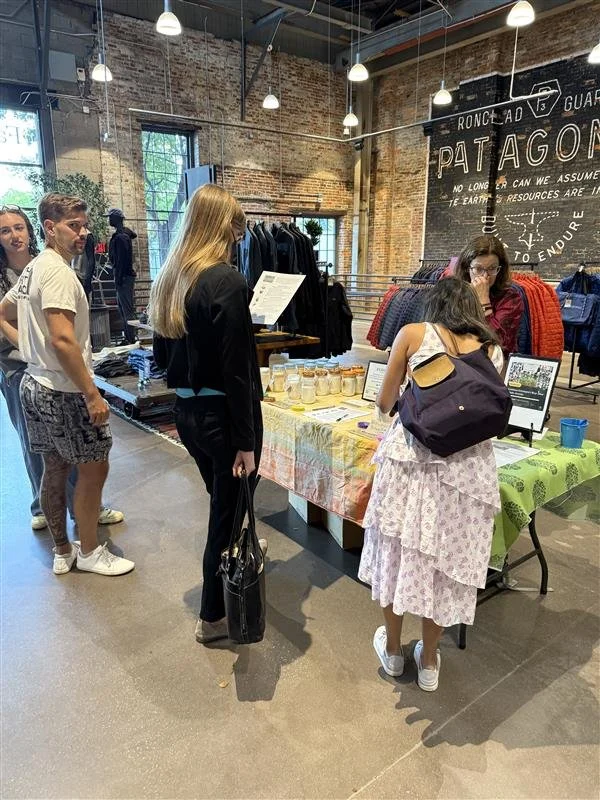Unpacking Plastic People: Film Screening and Community Discussion on Microplastics
Mr. Trash Wheel and the Trash Wheel family help keep unsightly trash out of Baltimore Harbor and ultimately the Chesapeake Bay and Waterfront Partnership of Baltimore uses the trash collection data to advocate for policy change around plastic pollution reduction. An emerging concern that the trash wheels cannot quantify is microplastics. To better understand the threat of microplastics, Patagonia and the Maryland Bottle Bill Coalition hosted a screening of "Plastic People- The Hidden Crisis of Microplastics", an 80-minute documentary about the prevalence of microplastics and their impact on human health. Plastic is everywhere in our world, and scientists are increasingly discovering the negative health and environmental impacts of the material.
The film was followed by a “Panel of Hope.” The panelists discussed their connection to plastic pollution and their efforts to help turn off the tap personally and professionally. The event also featured exhibitors who practice waste reduction in their products and business practices.











Panelists:
Dr. Jana Davis- President of the Chesapeake Bay Trust, a regional non-profit grant-making organization. The Trust’s mission is to empower local groups on the ground to identify, lead, and sustain their own community-driven projects. She’ll be presenting her personal story of trying to live with less plastic.
Dr. Elizabeth Ryznar- Associate Chair of Psychiatry at St. George's University and a part-time Assistant Professor in the Department of Psychiatry at Johns Hopkins School of Medicine, who researches the impact of plastic pollution on brain health.
Martha Ainsworth- Maryland Sierra Club's Zero Waste Team and drafted the National Sierra Club’s 2021 guidance on beverage container deposit-return systems. She currently leads the Sierra Club's campaign for a Maryland bottle bill.
Delegate Jen Terrasa- Represents District 13 in the Maryland House of Delegates and previously served on the Howard County Council for 12 years. She currently sits on the Environment and Transportation Committee and is the lead sponsor in the House of the Maryland Bottle Bill.
Malak Kebaish- Leads the East Coast Enterprise Solutions at Dispatch Goods, a women-led startup building circular logistics systems that replace single-use packaging with reusable alternatives. She works with large corporate campuses, healthcare providers, and food service operators to design and scale reuse systems that reduce waste while integrating seamlessly into existing operations.
Exhibitors: Echotopia, FOBA Refillery, Dispatch Goods
Maryland Bottle Bill Coalition Information Table.
The Maryland Bottle Deposit Bill was a highlighted solution during this event. The trash wheel collection data has proven the efficacy of policy change, with the Maryland Polystyrene Ban yielding an 80% reduction in styrofoam in our waterways. The Plastic Bag Ban in Baltimore City and Baltimore County led to a 55% reduction in plastic bags collected. Now plastic bottles fill the mouths of the Trash Wheels.
Each year in Maryland, about 5.5 billion beverage cans and bottles are sold, but only 1.4 billion are captured for recycling. The rest are incinerated, buried in landfills, or littered in our waterways and along roadways. Ten states in the U.S., covering about 90 million people, have long-standing, successful, and cost-effective beverage container deposit programs that incentivize recycling and deter littering by refunding a small deposit for each container to those who return them for recycling.
The Maryland Beverage Container Recycling Refund and Litter Reduction Program (a.k.a. the Maryland "Bottle Bill") would require a 10- or 15-cent deposit on single-use beverage containers that is refunded when the containers are returned for recycling. The program would:
Divert 3.6 billion beverage containers annually, of which 2.3 billion are plastic bottles, from landfills, incinerators, and the environment;
Reduce beverage container litter by at least 69-84%;
Boost Maryland's recycling rate for beverage containers from 25% to more than 90%;
Produce high-quality, food-grade materials for recycling into new beverage containers;
Yield substantial cost savings for local governments;
Encourage investments in reusable and refillable containers;
Create new jobs in Maryland; and
Reduce greenhouse gas emissions in the production of new containers from virgin materials.
Contact your State Representative and tell them you want a Bottle Deposit Program for Maryland NOW!
Learn more about the program here: https://www.sierraclub.org/maryland/zero-waste


